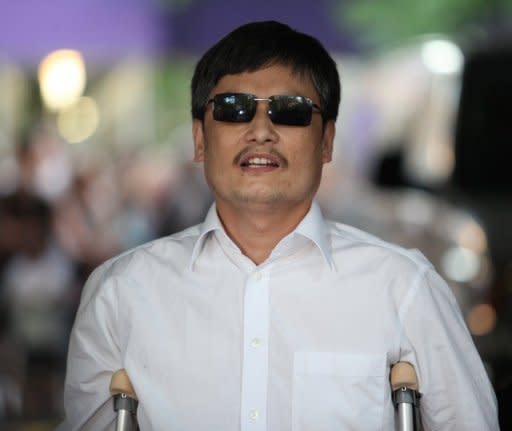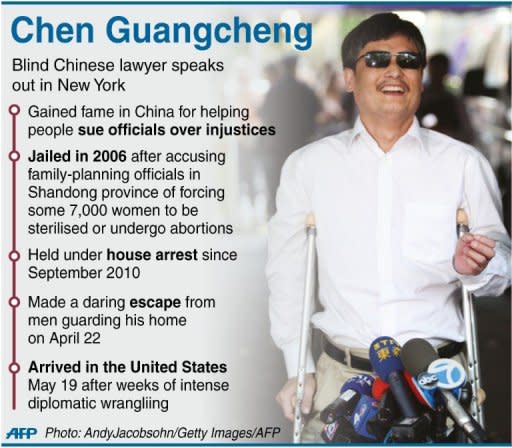Chen Guangcheng, in US, pledges to keep speaking out
Blind activist Chen Guangcheng has vowed to keep speaking out against rights abuses in China as he settles into a new life in New York following his dramatic escape from illegal detention. In his first US television interview, Chen told CNN Thursday that he had "no regrets" about his activism despite years of incarceration. "My nature wouldn't allow me to sit by and disregard what was going on," the 40-year-old said. Chen, a self-taught lawyer who exposed abuses in China's "one-child" population policy, arrived in the United States on Saturday after last month escaping unlawful house arrest and taking refuge at the US embassy in Beijing. After weeks of high-level sparring between diplomats from the world's two largest economies, Chen was eventually granted permission by Beijing to leave to take up the offer of a fellowship at New York University. Several other dissidents who have left China for exile abroad have lapsed into obscurity. But Chen, who has been blind since a childhood illness, said he would not be silenced. "If the pressure there couldn't silence me, I don't think any other pressure will be able to silence me," he said through a translator. Chen was sentenced to more than four years in prison in 2006 after accusing authorities in Shandong province's Linyi county of forcing up to 7,000 women to undergo late-term abortions or sterilizations. He was then placed under illegal house arrest upon his release in September 2010, and has accused hired thugs of regularly assaulting both himself and his wife. "Let's just say that my suffering was beyond imagination," Chen said, while restating his fears for relatives left behind, including his nephew Chen Kegui, who is in police custody on a charge of attempted murder. The nephew is accused of stabbing a local official who broke into his family's home when Chen Guangcheng's escape came to light in late April. Police said immediately after the attack that the official had survived and was receiving treatment in hospital. Since then they have refused all comment. "If action under such circumstances was not called self-defense, would there be any meaning left in having the term self-defense in Chinese law?" Chen said. "You can see their retribution against my family since my escape has continued and been intensified." The blind activist said he had expected to run afoul of the communist authorities for his legal campaign work, "but I didn't imagine they would disregard the law so blatantly." "It was very natural" to work on abuses stemming from the one-child policy, he said. "I feel it's in people's nature to want to stop evil and embrace good." Escaping the enforced detention at his village home, Chen last month scaled walls in the dead of night, badly hurting his foot in the process, before a getaway car took him from Shandong in China's east to the US embassy. After six days at the embassy, Chen spent more than two weeks at a Beijing hospital before suddenly being given notice to pack up his belongings and prepare for departure to New York. Chen, who is to become a research fellow at New York University's School of Law, has repeatedly said he is not seeking exile in the United States and may one day want to go back to China. When asked how it felt to sit in the sun on Sunday, the day after reaching New York, Chen told CNN: "I have missed out for too long."




